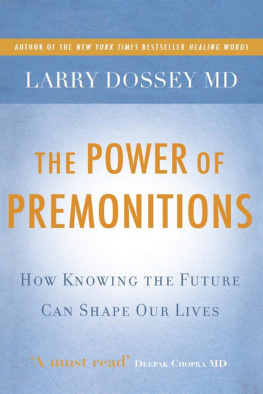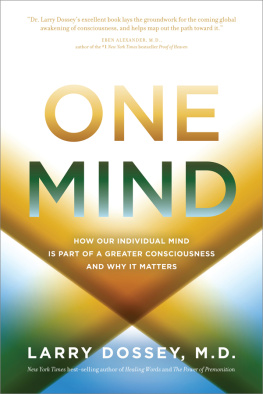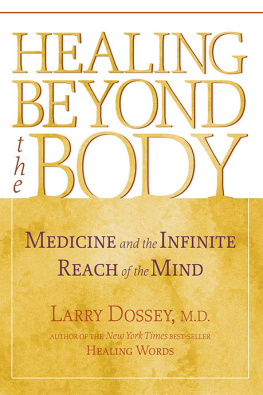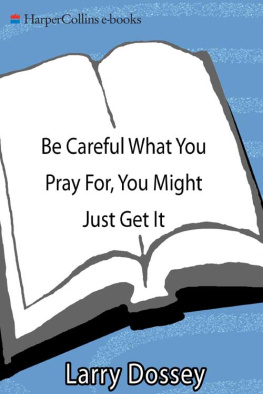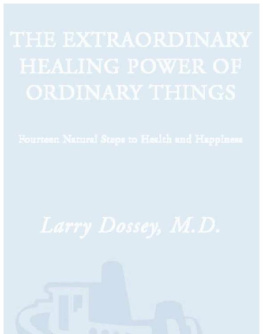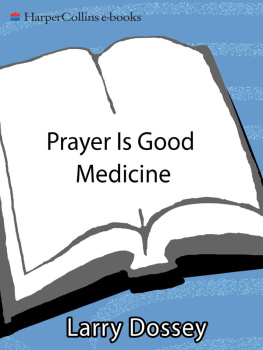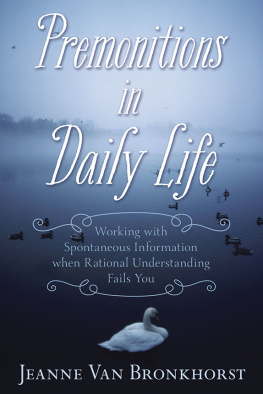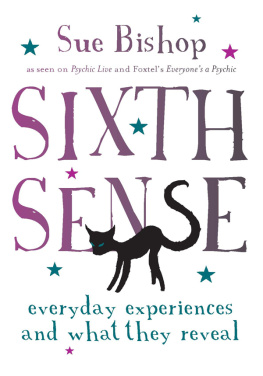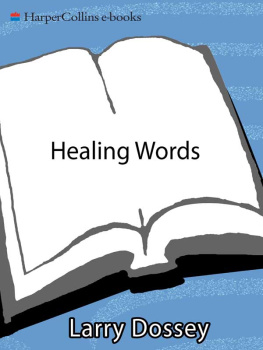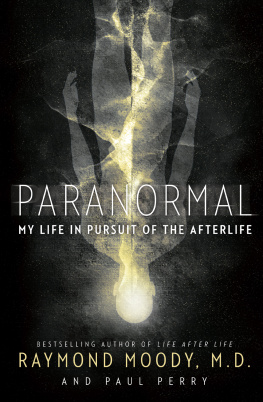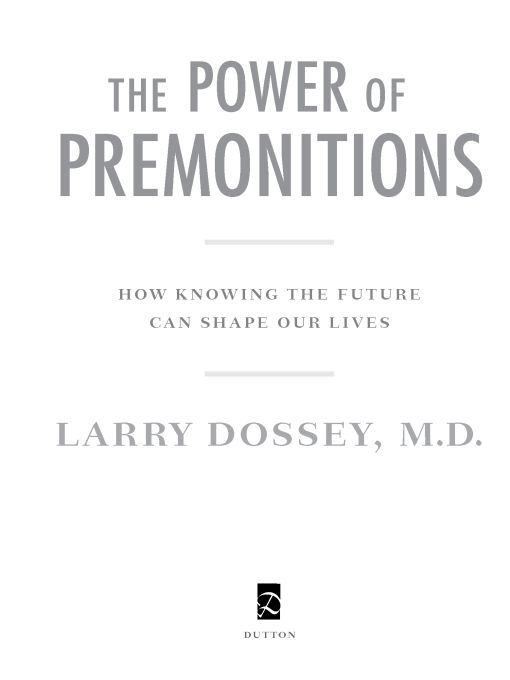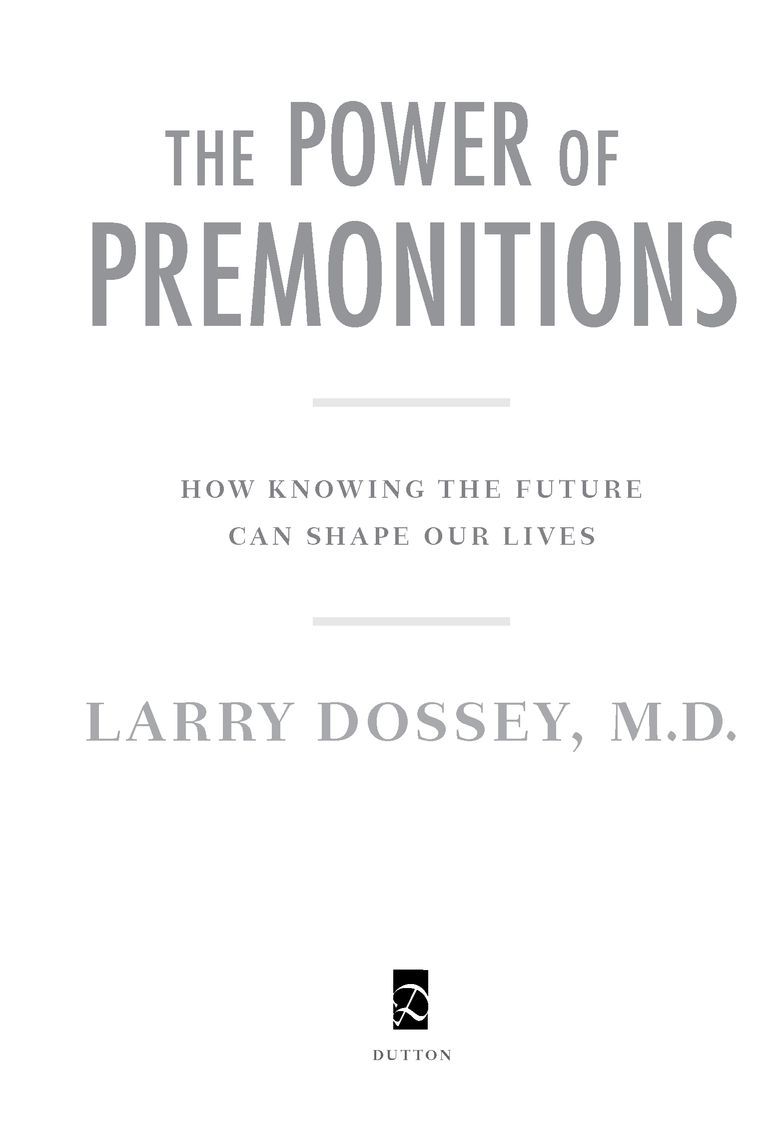Table of Contents
ALSO BY LARRY DOSSEY
The Extraordinary Healing Power of Ordinary Things
Healing Beyond the Body: Medicine and the Infinite Reach of the Mind
Reinventing Medicine: Beyond Mind-Body to a New Era of Healing
Be Careful What You Pray For... You Just Might Get It
Prayer Is Good Medicine: How to Reap the Healing Benefits of Prayer
Healing Words: The Power of Prayer and the Practice of Medicine
Meaning & Medicine
Recovering the Soul: A Scientific and Spiritual Approach
Beyond Illness: Discovering the Experience of Health
Space, Time & Medicine
For Barbara
FOREWORD
I live at 7,500 feet in the foothills of the Sangre de Cristo Mountains, a majestic tongue of the southern Rockies that extends into northern New Mexico. This is one of those blessed places where nature always seems to be in high-drama mode.
At this moment the world outside my window is transitioning from a harsh, snowy winter to a borderland season that is no longer winter, but not quite spring. The most obvious indicator that something is up is the birds. The finches, juncos, chickadees, nuthatches, doves, and flickers at the feeders are getting flirtatious. Yesterday, taking the cue, I emptied the birdhouses of last years nesting materials in preparation for another round of nest building and offspring.
Its not just the birds that are getting frisky. Although the pion and juniper trees are still hunkered down, the daffodils have made a foolhardy advance and are showing green shoots, which usually means they are about to get clobbered by a spring snow. Even the skies are livelier. The clouds are evolving toward showy cumulus formations, a dress rehearsal for their leading role in the violent thunderstorms of summer. Still, these rhythms of nature are protracted. It will be two full months before the earth tilts sufficiently toward the sun to banish frosty nights and permit me to plant my vegetable garden. In the meantime, I try to notice whats happening.
Notice. What a simple word for something so difficult! Ive been trying to get the hang of it for most of my adult life, ever since a little book gob-smacked me in the 1970s and revealed to me that I was quite a poor noticer. That grenade, How to Meditate, was authored by psychologist Lawrence LeShan, who did landmark research in the connections between the psyche and cancer at a time when the field hardly existed. LeShans shorthand definition of meditation was the art of doing one thing wellwhich, it turns out, is impossible without paying attention, without noticing. This is one of the most difficult tasks we can attempt, as anyone can discover in only a few minutes of trying to notice something intently, without the intrusion of extraneous thoughts and sensations.
The connections between noticing, meditation, and premonitions are profound. Meditation takes us outside the hubbub of flowing, rushing time into temporal stillness. During meditation, we sense our connectedness with all things in the past, present, and future. In this state, premonitions begin to seem not only possible, but likely. They begin to make sense.
Because both premonitions and meditation crash the barriers of time, meditation is a garden in which premonitions often flower. So as you read this book, I hope you will set aside time for stillness, whether you call it meditation, reverie, or solitude. All these activities are versions, literally, of time out and out of time. Become a good noticer. Pay attention to the feelings, hunches, and intuitions that flood your life each day. If you do, you will see that premonitions are not rare, but a natural part of our lives.
A bumper sticker says, GRAVITY. ITS NOT JUST A GOOD IDEA. ITS THE LAW. So it is with premonitions. They are a fact. They are ubiquitous. They follow certain patterns well try to discern. Our task is to acknowledge and claim this stunning ability, this great gift, in the task of becoming fully human.
AUTHORS NOTE
Some of the premonitions and dream narratives that follow have been compressed, paraphrased, or edited for reasons of clarity and coherence.
To protect privacy, some names and identifying characteristics of individuals have been changed.
A word about the terminology Ill be using. Extrasensory perception, or ESP, involves three basic categories of phenomena: telepathy, clairvoyance, and precognition. Generally speaking, telepathy is mind-to-mind communication; clairvoyance is a direct non-sensory awareness of objective physical events, not necessarily involving another mind. The non-sensory, non-inferred foreknowledge of a future event is precognition or premonition.
The term parapsychology (alongside psychology) was popularized in the 1930s by J. B. Rhine as a substitute term for what earlier researchers called psychical research. Parapsychology, also called psi, is an umbrella word that includes telepathy, clairvoyance, precognition, and psychokinesis, or PK. This latter term involves mentally affecting some physical object and is commonly called mind over matter.
In this book Ill use the terms parapsychology, paranormal, and psi interchangeably. Ill stick with these words because they have filtered into common usage. Im not happy with parapsychology or paranormal, however, because they convey a false impression. If these events occur, as I believe they do, they are a part of nature and are not para, or apart. This means they should be considered an integral part of natural science, not as some ill-bred stepchild that embarrasses the rest of the family. As British biologist Rupert Sheldrake once observed, Being a biologist, I wouldnt have much use for a field called parabiology. As a physician, neither would I have much use for a field called paramedicine. But alas, there is no ideal term to describe these challenging phenomena.
For generations, researchers have floundered in the search for the perfect term for psi phenomena. They still cant agree. Its rather like Louis Armstrongs celebrated response to a reporter who asked him to define jazz: If you dont know, I cant explain it to you. Why are premonitions and other psi events so slippery where language is concerned? Perhaps its because our language is geared to the see/touch/feel world. Psi, including premonitions, defy the senses. So its not surprising that language limps in our attempts to grasp these events verbally.
Ill interchange premonitions with the terms precognition, future knowing , and foreknowledge. Premonitions are also commonly referred to by a host of colloquialisms such as gut feelings, instinct, intuition, hunches, vibes, or sixth sense. If you wish, pick your own term. Be inventive, like a friend of mine who prefers to call her premonitions Factor X.
INTRODUCTION
Sometimes things grab hold and just wont let go. Thats what its been like with premonitions for me. Ive been wrestling with them for a long time, unable to detach, rather like Jacobs struggle with the angel in the Old Testament. The main difference is that Jacobs brawl lasted only one night. My tussle with premonitions has persisted for more than three decades and shows no sign of ending. Frankly I didnt know what I was getting into when I began my encounter with them. The entire experience is not unlike entering a quiet cave, only to arouse a sleeping grizzly.


